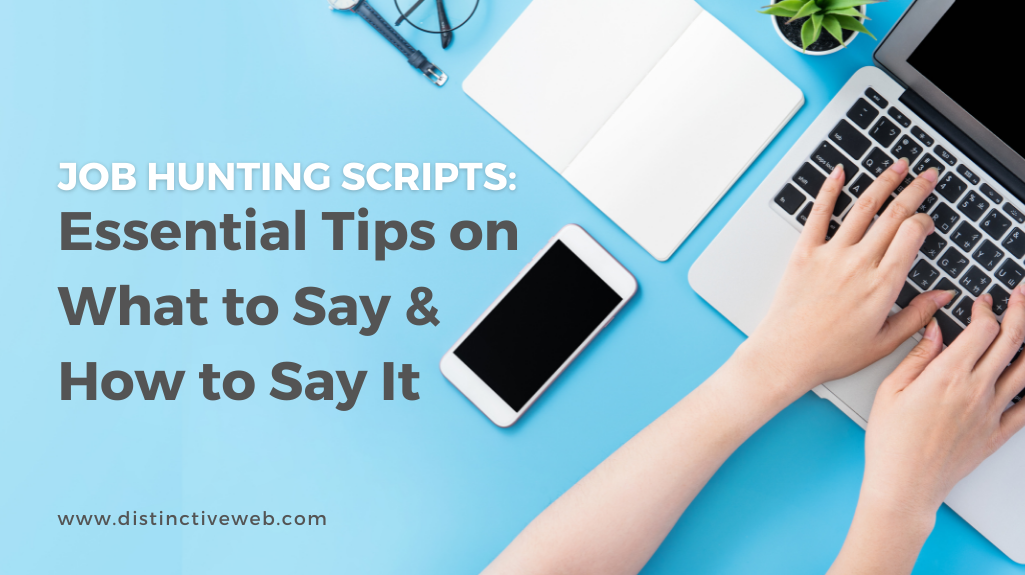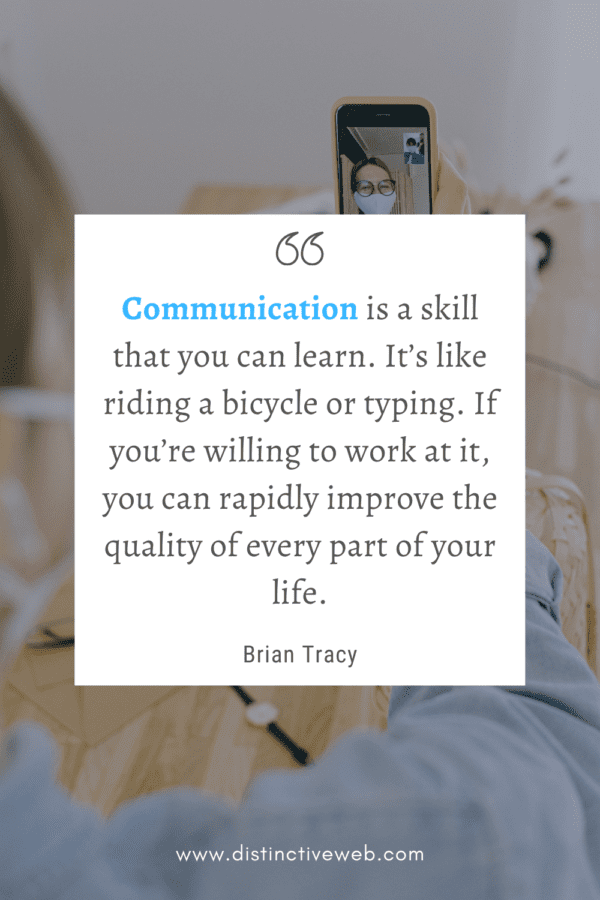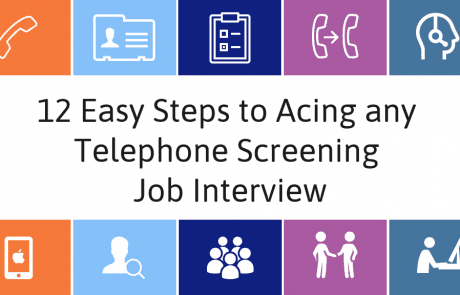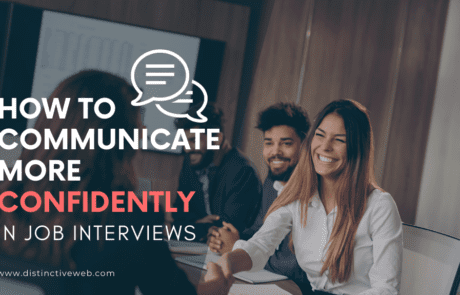
While many people struggle to handle the many interpersonal situations they find themselves in when job hunting, few people actually take the time to create job hunting scripts. Yet, doing so can give you a huge competitive advantage in the job market.
Being able to communicate well is a skill set at the top of the list when it comes to your career, and this is especially true when job searching. Confident people communicate with ease. Your voice and how you speak says a lot about your self-confidence. Becoming confident in your speech can give you the self-esteem boost you need to embrace your dreams and achieve your job hunting goals.
While it may seem like you are either born with confidence or not, the ability to communicate confidently is a skill set you can learn and acquire over time. And cliché or not, preparation and practice make perfect. One of the best ways to learn confident communication skills is to prepare for the various job-hunting situations you will find yourself dealing with. And the best way to prepare is to create job hunting scripts that you can practice.
While you will want to personalize the scripts to your own communication style, these job hunting scripts will help you know what to say and how to say it, increasing your ability to communicate with confidence.
With any of these situations, be prepared to leave a voice mail message if you don’t reach the person directly. Of course, you should leave a phone number in your message, but know that you may not get a callback. If you leave a voicemail, follow up 2-3 days later with an email.
Situation: Resume Follow Up
Use this script to follow up after sending a resume to see if interviews are being scheduled.
Preparation:
Know the name of the person you’re calling (and how to pronounce their name) or, if you only know the title of the person responsible for hiring, call the company’s general number and get the name (and pronunciation).
 Make the Call:
Make the Call:
Hi! My name is (your name).
[If you have a mutual connection or were referred to the position by someone specific, mention it. For example: “Jane Jones suggested that I speak with you.” People are more likely to take the time to talk to you if you mention a mutual friend or acquaintance, so always mention the common connection.]
Do you have a minute?
[If no: “When would be a good time for me to call back?”]
I submitted (my resume/an application) for the position of (name of job) on (date).
(Provide a one- or two-sentence summary of your qualifications and what you can offer to the company in this role.)
I wanted to make sure you had everything you need from me to consider me as a candidate for this position. And I wanted to ask if you have a date when you expect to start interviewing for this role.
[If yes: Thank you. I appreciate the opportunity to talk with you today.]
[If no: Is it okay if I check back with you in a week?]
How It Might Sound:
You: Hi! My name is Allen Edwards. Our mutual friend, Karen Driscoll suggested that I speak with you. Do you have a minute to talk right now?
Hiring Manager: Yes, but I have another call in 5 minutes, so I’ll have to make it quick.
You: I understand. This will only take a minute or two. I submitted my resume for the Public Relations Specialist role last Tuesday. I’m currently working for Acme PR and, as you require, I have 10 years of experience in pitching, account management, and media relations. I wanted to make sure you had everything you need from me to consider me as a candidate for this position. And I wondered if you have a date when you expect to start interviewing for this role.
Hiring Manager: No, we’re still accepting applications at this time. If you submitted your application online, I’m sure I have it, but if you want to send your resume to my email, you can do that too. My email is manager@email.com.
You: Ok. Would it be okay if I also check back with you again at the end of next week?
Hiring Manager: Sure.
You: Thank you, I’ll check back in on the 15th then and I’ll email you my resume. Thanks for the opportunity to talk with you today.
Situation: Interview Follow Up
Use this script to follow up after an interview if you haven’t heard anything back.
Preparation:
- Send a written thank you note within 48 hours after the interview.
- If you were given a timeframe in the interview for a decision or next step and that time has passed (at least one day after the date you were told — but preferably 2-3 days afterward, since people are busy), it’s a good idea to follow up.
- Note: Consider an email as your first follow-up unless the hiring manager gave you permission at the end of the interview to call OR if it’s been more than a week and you haven’t received a reply to your email follow-up.
Make the Call:
Hi. This is (your name) and I interviewed with you for the position of (job title) on (date).
I wanted to reiterate that I’m very interested in the job, and I wondered: Are you close to making a decision yet?
[If no: I wanted to be sure you had all the information you needed from me. Is there anything else I can provide you with to help you make your decision?]
[If yes: That’s great. Am I still being considered?
Do you have a timetable for when you expect to make the decision? What is the next step?
[If the answer is “I don’t know” or you are given a future date, ask if you can follow-up.]
When would be an appropriate time for me to check back with you? I’m excited about this opportunity, but I know these things take time.
[Hiring manager may give a specific time or may be noncommittal.]
Thanks again for the opportunity to be considered for this job.
How It Might Sound:
You: Hi. This is Jane Doe and I interviewed with you for the position of PR Specialist on the 28th. I wanted to let you know I’m still very interested in this job, and I wondered if you are close to making a decision yet.
Hiring Manager: I’m sorry, I’ve been swamped and haven’t had time to schedule the next round of interviews.
You: No problem. Am I still being considered for the job? And if so, is there anything else I can provide you with to help you make your decision?
Hiring Manager: No, I think I have everything I need.
You: Great. When would be an appropriate time for me to check back in with you? I’m excited about this opportunity, but I know these things take time.
Hiring Manager: Maybe in a week or two?
You: Thank you, I’ll check back in on the 17th then. Thanks again for the opportunity to be considered for this job.
Situation: Asking for an Informational Interview
If there is a company you’d like to work for, use this script to ask for an informational interview. This can also be a script if you identify a contact who can give you information or help you network to a job.
 Preparation:
Preparation:
• Try to find someone you already know at the target company. Look at the company’s page on LinkedIn and see if you already know someone at the company who can help introduce you to the person you want to talk to/meet.
• If you don’t have a specific name, research the company’s website and/or LinkedIn company profile to see if you can find the name, title, and phone number of the person who hires for and/or oversees the job you want.
Make the Call:
Hi! My name is (your name) and I was given your name as the person who oversees the (name of) department or hires (job titles).
OR
[If you were referred to them by someone, mention that. Or, if you have something else in common — like your alma mater or a professional association, use that as your lead-in.]
I’m looking to make connections in the ____ field. I know you’re not currently hiring, but I was hoping you might be able to provide me with some advice.
Would you mind if I asked you a couple of questions?
[If no, ask if you can schedule a time to talk to them later.]
[If yes, give a quick summary of your background and qualifications and then ask one or more specific questions]
- (If the job you want isn’t currently open): How do you typically fill positions within your department? Do you hire from within or do you advertise them? And, if so, where? Or do you work with a recruiter? (in-house or which firm or firms do you typically work with?)
- How do you like working for the company? [If you’ve researched the person on LinkedIn, you can ask more specific questions.]
- Do you know of another department within the company — or another company — that might be hiring (job titles)?
- How can I be helpful to you?
Thank you for your time.
How It Might Sound:
You: Hi! My name is Brandy Smith and we’re both members of the Public Relations Society of America. I’ve seen you at a couple of meetings, but we’ve never formally met. I’m looking to make connections in the public relations field. I was hoping you’d have a couple of minutes to provide me with some advice. Would you mind if I asked you a couple of questions? I promise I’ll keep it short.
Contact: Sure, I’ll try to answer a question or two for you, if I can.
You: I’ve worked with a couple of agencies — I’m currently a PR Specialist with Acme PR and previously worked as an Account Executive for Johnson Marsdale for five years before that, specializing in pitching, account service, and media relations. I was wondering how your agency typically fills positions when they come open. Do you hire from within, do you advertise them, or do you work with recruiters?
Contact: We usually put up postings on the PRSA job board and Indeed but we also work with recruiters — usually PR Talent and Bloom Gross & Associates.
You: Great. Can I ask how you got hired at Melville, Asher & Company?
Contact: One of my former bosses came to work here and he hired me away. They actually created a job for me, and then I was promoted into my current role two years ago.
You: That’s great. I see from your LinkedIn profile that you’re well connected in the industry. Do you happen to know of any companies that might be hiring PR specialists focusing on ag and farming clients? That’s my specialty.
Contact: I don’t know of anyone specifically that’s hiring, but I am friends with Courtney Landry over at Miller & Jackson PR and I know they have a couple of ag and farming accounts. You’re welcome to drop my name if you want to ask her about openings.
You: Thank you. I really appreciate it. One last thing: Is there anything I can do for you? I really appreciate you taking the time to talk to me today.
Contact: No, I can’t think of anything. But do say hi if you are at next month’s PRSA meeting.
You: Will do. Thanks again.
Learn to Communicate Confidently in All Situations
Great communicators have many things in common. They are confident, convicted about what they are sharing, and have a way of connecting with their audiences. With these scripts for job hunters, you are armed and ready to take on nearly any type of job search communication. Using these as a guide, create job hunting scripts for all the various situations you will find yourself dealing with when job searching.
The real benefit of speaking with confidence, though, is that it is one important way that you embrace and build upon your personal power. Your words, your tone, and your boundaries while communication with others are indicators of whether you are claiming and honoring your personal power. And, there is no better time to do this than when you are searching for your next job opportunity. Preparation and practice is all it takes.









